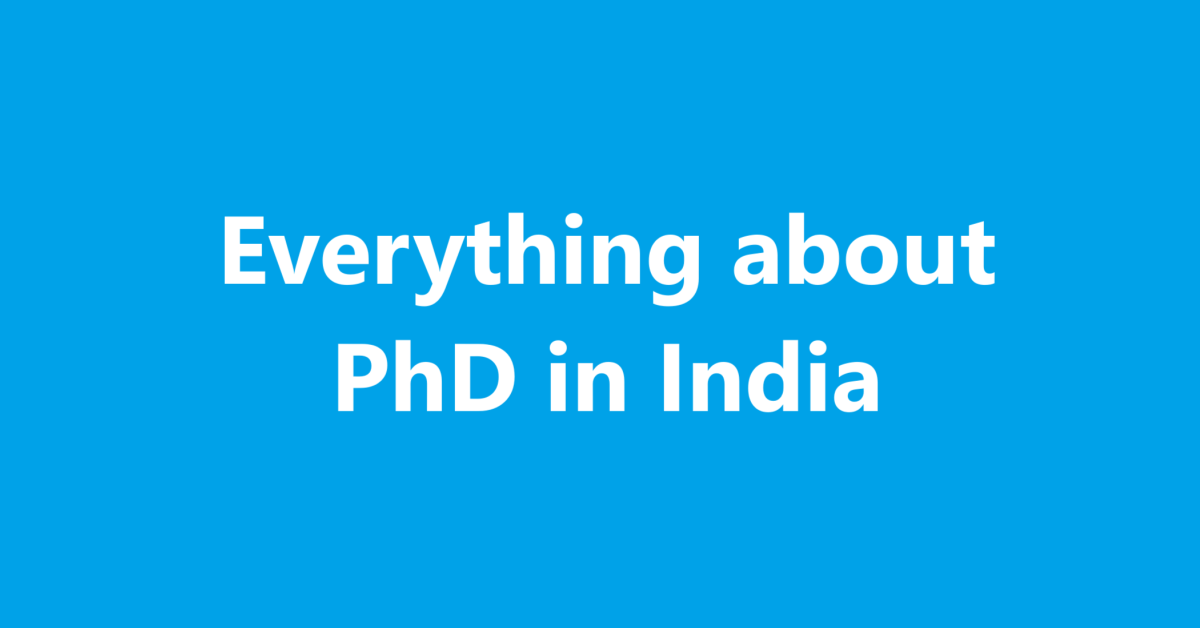Here’s a Comprehensive overview of pursuing a Doctor of Philosophy (PhD) degree in India, covering various aspects such as program structure, admission process, research areas, career opportunities, and more.
What is a PhD?
A Doctor of Philosophy (PhD) is a doctoral degree that represents the highest level of academic achievement in a specific field of study. The program typically involves extensive research, culminating in a dissertation that contributes original knowledge to the chosen discipline.
Duration of the Program
- The duration of a PhD program in India varies but generally takes about 3 to 6 years to complete, depending on the field of study, research progress, and institution requirements.
Eligibility Criteria
- Educational Qualification:
- A candidate must hold a Master’s degree (or equivalent) in the relevant field with a minimum aggregate of 55% (50% for reserved categories).
- Some programs may accept candidates with a bachelor’s degree in certain cases if they have relevant research experience.
- Entrance Exams:
- Some institutions require candidates to clear entrance exams like:
- UGC NET (National Eligibility Test)
- CSIR NET (for science disciplines)
- GATE (Graduate Aptitude Test in Engineering)
- Institutional entrance exams
- Some institutions require candidates to clear entrance exams like:
Admission Process
- Application Submission:
- Candidates must submit an application form along with required documents, including academic transcripts and a research proposal.
- Research Proposal:
- A well-structured research proposal outlining the intended study area, objectives, methodology, and relevance is typically required.
- Interviews:
- Shortlisted candidates may need to participate in a personal interview or discussion with faculty members, wherein they will present their research proposal.
- Admission Offer:
- Successful candidates receive an admission offer, which may be contingent upon fulfilling additional criteria or conditions.
Research Areas
PhD programs in India cover a wide range of disciplines, including but not limited to:
- Arts and Humanities
- Social Sciences
- Natural Sciences
- Engineering and Technology
- Business and Management
- Health Sciences
- Education
- Law
Curriculum and Structure
- Coursework:
- Many PhD programs begin with mandatory coursework to provide foundational knowledge in research methodology, data analysis, and the relevant subject area.
- Research Work:
- The primary focus of the PhD program is on independent research, which culminates in the submission of a dissertation or thesis.
- Seminars and Conferences:
- Students may be required to present their research at seminars and conferences to gain feedback and engage with the academic community.
Career Opportunities
PhD graduates can explore various career paths, including:
- Academics:
- University or college professor/lecturer in their field of expertise.
- Research Positions:
- Researchers in think tanks, government research institutions, and private sector R&D departments.
- Industry:
- High-level positions in corporate research and development, product innovation, and management consulting.
- Government:
- Administrative roles and positions in public sector undertakings (PSUs).
- Entrepreneurship:
- Starting their own ventures or consulting businesses leveraging their research expertise.
Salary Expectations
- Starting Salaries: Beginning salaries for PhD graduates can vary widely based on the field and position, typically ranging from ₹6 lakh to ₹15 lakh per annum.
- Experienced Professionals: With experience, salaries can increase significantly, often exceeding ₹20 lakh per annum for senior or specialized roles.
Benefits of Pursuing a PhD
- Expertise: PhD candidates become experts in their chosen field, contributing original knowledge and insights.
- Career Advancement: A PhD can lead to better job prospects, higher salaries, and higher-level positions.
- Research Opportunities: Engaging in cutting-edge research can lead to numerous publications and collaborations.
Here are some frequently asked questions (FAQs) about pursuing a Doctor of Philosophy (PhD) degree in India, along with detailed answers:
FAQs About PhD in India
1. What is the duration of a PhD program in India?
The duration of a PhD program typically ranges from 3 to 6 years, depending on the field of study, research progress, and individual circumstances.
2. What are the eligibility criteria for PhD admissions?
- Educational Qualification: Candidates must possess a Master’s degree (or equivalent) in the relevant field with a minimum aggregate of 55% (50% for reserved categories).
- Entrance Exams: Some institutions require candidates to qualify for entrance exams like UGC NET, CSIR NET, or institutional entrance exams.
3. How can I apply for a PhD program?
Applications can be submitted online or offline depending on the institution. You’ll need to fill out an application form, submit required documents (such as academic transcripts and a research proposal), and may need to attend an interview.
4. Is a research proposal mandatory for applying to a PhD program?
Yes, a well-structured research proposal outlining the intended study area, objectives, methodology, and relevance is typically required as part of the application process.
5. What subjects can I pursue a PhD in?
PhD programs are available in a wide range of disciplines, including but not limited to:
- Arts and Humanities
- Social Sciences
- Natural Sciences
- Engineering and Technology
- Business and Management
- Health Sciences
- Education
- Law
6. What is the structure of a PhD program?
A PhD program usually includes:
- Coursework: Foundational courses in research methodologies and the relevant subject.
- Research Work: The primary focus, culminating in a dissertation or thesis.
- Seminars: Presentations at seminars and conferences to discuss research findings.
7. What career opportunities are available for PhD graduates?
Graduates can pursue various careers, including:
- University or college professor/lecturer
- Researcher in think tanks or government institutions
- High-level positions in industry R&D
- Roles in government or public sector
- Entrepreneurship or consultancy
8. What is the expected salary range for PhD graduates?
Starting salaries typically range from ₹6 lakh to ₹15 lakh per annum, and experienced professionals can earn above ₹20 lakh per annum, depending on the field and position.
9. Can I pursue a PhD while working?
Yes, many institutions offer part-time PhD programs for working professionals. However, it may require effective time management to balance work and research commitments.
10. Are there financial aid options available for PhD students?
Many universities provide scholarships, assistantships, or fellowships to help finance PhD studies. Candidates should inquire about financial aid offered by their preferred institutions.
11. What are the benefits of pursuing a PhD?
The benefits include:
- Specialized expertise in a specific field
- Enhanced career prospects and job opportunities
- Opportunities for contributing original research to the field
12. How do I choose a research topic for my PhD?
Selecting a research topic should involve:
- Identifying areas of personal interest and passion.
- Reviewing current literature and gaps in research.
- Consulting with potential supervisors or faculty members for guidance.
13. How is the dissertation evaluated?
The dissertation is typically evaluated by a committee of experts, who assess the originality, significance, research methodology, findings, and overall contribution to the field.
14. Is publishing research essential during a PhD?
While not mandatory, publishing research findings in academic journals is encouraged and can enhance career prospects and academic credibility.
Conclusion
Pursuing a PhD in India offers a pathway to advanced knowledge and research skills in various fields, providing an opportunity to contribute significantly to academia and industry.


